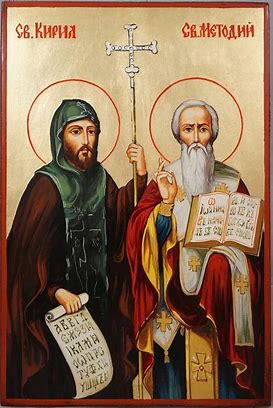
ST. CYRIL AND METHODIUS
Two brothers, named Michael and Constantine, became the famous saints, Methodius and Cyril, “Apostles to the Slavs”. Michael was born around 815AD and his younger brother, about 826AD. Their home was in Thessalonica, Greece. Their father was Leo, the commander of a Byzantine theme (military division) and their mother was Maria. They were two of seven children. When the youngest, Cyril, was 14, their father died.
Theokistos, a senior fiscal minister in the government, became their mentor. He and Barda, another high minister, initiated an educational program in the Byzantine empire including the establishment of the University of Magnaura. Constantine was going to teach. Michael was already a deacon.
In 860, the Byzantine Emperor Michael III and the Patriarch Photius, Constantine’s previous professor, sent him on a mission. The prince of the Khazars had requested a scholar who could converse with both Jews and Saracens. This was the area covering what is now southeast European Russia, southern Ukraine, Crimea and Kazakstan. The young professor learned the Khazar language in Crimea. It was a successful first missionary journey for the young man.
When Constantine returned, he became a professor of philosophy. By the time he got back, Michael had become significant in politics and administration and was now an abbot of a monastery. He had taken the name Methodius.
A year later, Prince Rastislav of Great Moravia (what is now the Czech Republic, Slovakia, parts of Poland, parts of Hungary and Serbia) asked the emperor to send Eastern Christian missionaries. This was seen as more of a political than a religious request. In the first few years there, the two brothers translated parts of the Old and New Testaments and the liturgy into a new alphabet for the Slavonic languages. They even developed and wrote the first Slavic Civil Code.
The prince was run out of office and the politics of the princedom changed quickly. Missionaries from East Francia showed up and insisted that the clerics use Latin only, for uniformity’s sake. From there the arguments developed regarding the ecclesiastical control of the land, especially Moravia and Pannonia. The German episcopates, especially the archbishop of Salzburg, claimed their rights were infringed. Pope Nicholas I heard about this situation and invited the missionaries to Rome in 867. They came, with several men to be ordained.
The following year, the entourage arrived, bearing relics of Pope Clement. But Nicholas had died. They were welcomed by Pope Adrian II. He ordained Methodius and the other young men. He consecrated Methodius archbishop of Sironium (now in Serbia), with jurisdiction over Moravia and Pannonia. The pope was aware of the split between East and West and chose to use the brothers as a way of attracting the more Orthodox Easterners to join with Rome. So, he allowed the Slavic language in liturgy. Meanwhile, Constantine was not well. He was admitted into the Basilian monastery, taking the name Cyril, and died shortly after on February 14, 869.
Heartbroken, Methodius could not function for a while. He left Rome, eventually, to go to his new post in Sironium. The Germanic bishops had not accepted the ruling of the pope. Methodius’ claims were considered an insult to them. Eventually he was forcibly taken to Germany and kept as a prisoner for two and a half years. The new pope, John VIII was able to get him released in 873. However, he was instructed to stop the Slavonic liturgy.
Methodius did not always follow the good pope’s instructions. He continued to say Mass in Slavic. In 878, he was summoned to Rome to answer charges of heresy and using the Slavic language in liturgy. He was given permission to use the Slavonic liturgy. But while he was in Rome, a Carolingian bishop, Wiching, was assigned as his co-adjutor. This man suppressed the use of the Slavic language and forced Michael’s followers into exile. Many went to Bulgaria and began a Slavic-speaking church there.
The politics of the Church was rocky at best and when Pope John VIII died in 882, Methodius was in an insecure position. The surviving brother, still an archbishop, died just a few years later. The successor he named was not recognized. Pope Stephen V gave the archbishopric to Bishop Wiching and forbade Slavic from being used any longer. The followers of Methodius were exiled from Great Moravia. Many fled to the Bulgarian Empire to begin again. Many helped preserve the translation work the two brothers began.
The interesting part of the whole story is that, despite the religious intentions of the brothers, they are mostly known for the development of the Glagolitic alphabet. This alphabet was developed further into the Cyrillic alphabet, which is still currently used in Slavic languages, including Russian.

Recent Comments